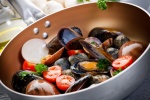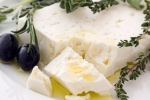Cyprus cuisine
CYPRUS CUISINE. Cypriots have a tender relationship with their traditions, including those of the culinary type. Cuisine – is a part of the culture, the history, the soul of the people. Cypriot cuisine does not tolerate rushing. It is appetizing, varied and extensive. Its aromas will follow your every pursue you continuously. It will satisfy gourmets, those that enjoy to eat both a lot and tasty and vegetarians. Cypriot dishes are prepared from fresh products with large amounts of vegetables, are seasoned with local herbs and olive oil, which makes them not only tasty but also healthy.
CYPRUS CUISINE
The Cypriot cuisine has incorporated into itself the culinary traditions of the neighboring countries – Lebanon, Turkey, and Israel. It has also been affected by the numerous conquerors of the past but, naturally, its closest ties are to that of Greek cuisine. However, despite all the similarities to the Greek cuisine, Cypriot dishes have their own distinguishing characteristics that set them apart. There are dishes and products which are inherent exclusively to Cyprus, such as the cheese halloumi.
Another distinguishing feature is «meze». Translating from Greek, «mezes» is simply a snack. In Cyprus however, this is the name of an assortment of 20-30 dishes, starting with appetizers, salads and vegetables and finishing with meat and fish dishes. Thus, having come to a tavern and not knowing what to choose, order meze – and you will experience many of the local foods. Some restaurants and taverns offer fish-only or meat-only meze.
In practice though, those should only be ordered if you have time to spare – the plates may be small but there are very many of them. In addition, meze is best accompanied with local wine and a group of friends. The food must be eaten «siga-siga», i.e. slowly, so as to reach the last dishes. Cypriot cuisine does not tolerate rushing.
Meze often includes the following dishes and appetizers: Lukanika – cured and coriander seasoned salami pickled in red wine. Coupelia – rice and meat-stuffed grape leaf rolls. Loundza – smoked pork chops that are served in sandwiches together with the soft halloumi cheese prepared from sheep or goat milk and often seasoned with mint. Sheftalia – grilled pork chops, aphelia – pork pickled in wine and coriander, stifado – beef or rabbit stewed in grape vinegar with onions and seasonings, and kleftiko – lamb baked with mint in a clay furnace.
In fish taverns, you will be served calamari, octopi in red wine or grilled, red mullet and marine perch.
Popular among the vegetable dishes are boiled potatoes with parsley and in olive oil, pickled cauliflower and beet, zucchini, kolokasi (sweet root similar to potatoes) and asparagus.
Certainly present are the classical dishes of the Greek cuisine:
Greek salad (horiatiki salata) from tomatoes, cucumbers, lettuce, peppers, feta cheese, green olives and local seasonings. Moussaka – a traditional Greek dish, a macaroni casserole with forcemeat and eggplants, covered in béchamel sauce. And, of course, souvlaki – small pieces of skewered and grilled pork, lamb or chicken.
All those dishes and many others can be ordered separately. The cost of a meze is that of a good dinner.
For dessert, fresh fruit are often served in Cyprus. Popular sweet dishes are loukoumades – Cypriot doughnuts in honey syrup, daktyla - «ladies’ fingers» with almonds or walnuts and cinnamon, as well as shiamishi – a pie cut in parts with filling made from semolina and oranges. Often served in cafes are kolokotes – pumpkin pie, pourgouri and raisins, as well as pastelaki – a dessert made from sesame seeds, peanuts and honey syrup. Definite dishes to try are galaktoboureko – a layered custard pie and the local loukoumi.
P.S.CYPRUS CUISINE trace their gastronomic heritage to their long, turbulent history and to the geographic position of the island in the East Mediterranean acting as the hub between three continents. The local gastronomy has been influenced over the years by factors such as:
• the deep rooted Greek civilization and culture with the dominance of the Greek diet and the concept of taverna and meze
• the many foreign rulers (Lusignians, Arabs, Ottomans) who brought along their own food habits which were gradually adopted as local
• the favorable climate allowing the production of natural food ingredients
• the long history of the island in grape and wine production.
These factors have played their role in shaping the traditional Cypriot food and drink diet along with its unique products. The businesses associated with such food and drink products testify to the unique abilities of Cypriots to exploit the gifts of their land and to create healthy and tasty products.
Today, there exists a widespread acceptance that products from the Mediterranean countries represent an excellent choice in gourmet needs. Even more important, is the general consensus among health professionals that Mediterranean nutrition and especially the Greek diet is the healthier of the world. The products of Cyprus represent exactly this diet, bridging and bringing together taste and health. Nothing is better!
A recent edition of the Journal of American Medical Association notes the health giving praises of the Mediterranean-style diet in two separate studies, which show that following closely such a diet improves healthy longevity and prevents the development of metabolic syndrome (a condition characterized by obesity and high blood pressure).
CYPRUS CUISINE. For centuries, Cypriots have lived on and enjoyed their version of Mediterranean diet. Today in a world of even more uniform tastes and a gradual shift to Western style food habits, the effort to retain customary loyalty to distinctive local food and wines, becomes a hard one indeed.
A growing number of Cyprus’ authentic food products are due for getting official protection under European Union regulations for PDO (Protected Designation of Origin) and PGI (Protected Geographical Indication).On the one hand, a new direction away from globalization of dietary habits should be taken by consumers.
On the other hand, local producers need to dedicate themselves to delivering top quality products, using genuine raw materials, innovative packaging and a diversified range of product recipes and packaging options that will suit today’s market needs.











